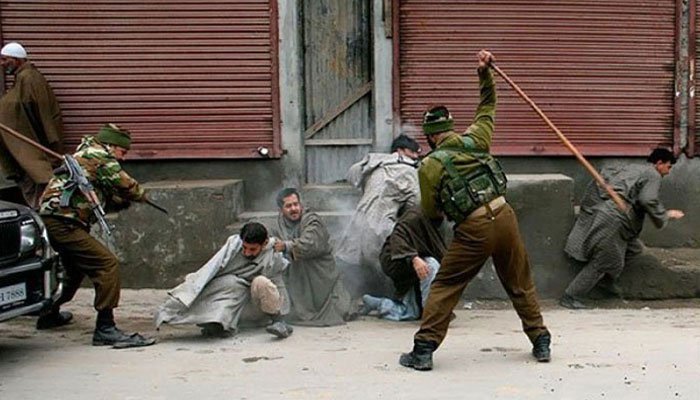The second anniversary of the Indian government’s illegal actions in occupied Jammu and Kashmir falls on Thursday, August 5. India’s unilateral actions were a blatant violation of UN Security Council (UNSC) resolutions.
Through its oft-repeated lies, deceit and propaganda, the Indian government has made every effort to disfigure the Kashmiris’ legitimate struggle and distort history so as to discredit their lawful claim to their land and rights. It is only pertinent to highlight some of the facts of the issue.
In the last two years, the illegally occupied Jammu and Kashmir has remained under military siege, with many restrictions on the fundamental freedoms of the Kashmiri people. They have faced oppression, including internet shutdowns, cordons, search operations and fake encounters. Murder, torture, enforced disappearances, extrajudicial killings, illegal detentions, rape/molestation, mass blinding, the use of citizens including children as human shields, persecution of the Muslim-majority population, and demographic change have been India’s preferred tools for unleashing state-sponsored terrorism in Jammu and Kashmir.
While the rest of the world has grappled with the distresses of the coronavirus pandemic (COVID-19), the average Kashmiri’s life in Jammu and Kashmir has remained hostage to the Indian sabotage of any semblance of normality, trumping even the Kashmir Valley’s own abysmal standards.
In the last two years, the Indian government has carried out war crimes in Jammu and Kashmir on a scale that is unprecedented in modern history and calls into question the verity of the international order. During this year alone, the Indian occupation forces have extrajudicially killed 85 innocent Kashmiris, including young boys and women; arbitrarily arrested and detained 537 Kashmiris; and destroyed 31 houses belonging to Kashmiri people.
The Indian government has also initiated a dangerous machination aimed at bringing about demographic change in the state. These actions are aimed at forcefully marginalizing the Muslim majority of the state and denying the Kashmiri people their inalienable right to self-determination. To this end, the Bharatiya Janata Party (BJP) government has allowed “citizens of India” to purchase non-agricultural land in Jammu and Kashmir, offered incentives to the Hindus of India to settle on Kashmiri lands, and initiated the process of replacing the Urdu language with Hindi. These steps have been strongly rejected by the Kashmiris, Pakistan and the international community.
Several reports by the UN, international humanitarian organizations and nongovernmental organizations, including from within India, have documented many crimes against humanity perpetrated in Jammu and Kashmir. Michelle Bachelet, the UN High Commissioner for Human Rights, has shown concern over the deteriorating situation in the state. The UN has also expressed grave concerns about the indiscriminate targeting of Kashmiris with pellet guns. During the last two years, more than 490 Kashmiris have sustained pellet gun injuries. According to a 2018 Amnesty International report, titled “Losing Sight in Kashmir: The Impact of Pellet-Firing Shotguns,” a weapon meant to be deployed for “crowd control” has been responsible for blinding, killing and traumatizing people in Kashmir.
A recent Office of the High Commissioner for Human Rights report highlighted the implications of the 2019 revocation of Jammu and Kashmir’s special status on minorities, including Muslims, and Indian attempts to alter the demographics of the region.
The Indian government may claim that the Kashmir issue is an internal matter, but numerous UNSC resolutions, the UN secretary-general’s statement of August 8, 2019, and the UNSC meetings of August 2019, January 2020 and August 2020 stare India square in the face, as a stark reminder of the irrefutable reality that Kashmir is an internationally recognized disputed territory.
The Kashmir issue also tops the agenda of the Organization of Islamic Cooperation (OIC). The OIC Secretariat and its Independent Permanent Human Rights Commission have issued multiple statements and reports condemning India’s illegal and unilateral actions, as well as its serious human rights violations.
During the 47th Session of the OIC Council of Foreign Ministers in Niger last November, a strongly worded resolution on the situation in Jammu and Kashmir was unanimously adopted. It categorically rejected all illegal and unilateral actions taken by India since Aug. 5, 2019. The OIC Contact Group on Jammu and Kashmir, whose most recent meeting was held on February 5 on the occasion of Kashmir Solidarity Day, has unanimously called on India to rescind its unilateral actions, condemned human rights violations against the Kashmiri people, and reaffirmed support for the Kashmiris’ right to self-determination.
The Kashmir issue forms the core of Pakistan’s foreign policy. Pakistanis are deeply and emotionally attached to the Kashmiri cause. Prime Minister Imran Khan has been spearheading Islamabad’s diplomatic efforts in support of our oppressed brothers and sisters in occupied Jammu and Kashmir. Pakistan will continue to extend all possible political, diplomatic and moral support to the Kashmiris and help them attain their right to self-determination — a right promised to them by UN Security Council resolutions.
*The writer is Pakistan’s ambassador to Saudi Arabia.
August 5, 2021
The viewpoints expressed by the authors do not necessarily reflect the opinions, viewpoints and editorial policies of Aequitas Review.


